句型短语结构
五大句型基本结构及例句
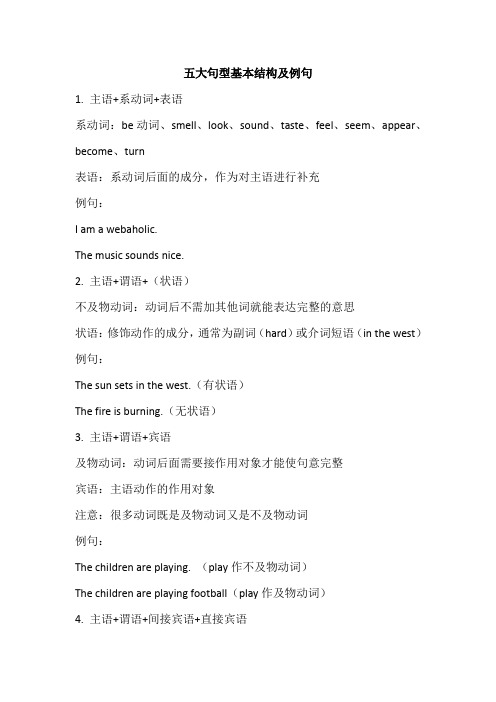
五大句型基本结构及例句
1. 主语+系动词+表语
系动词:be动词、smell、look、sound、taste、feel、seem、appear、become、turn
表语:系动词后面的成分,作为对主语进行补充
例句:
I am a webaholic.
The music sounds nice.
2. 主语+谓语+(状语)
不及物动词:动词后不需加其他词就能表达完整的意思
状语:修饰动作的成分,通常为副词(hard)或介词短语(in the west)例句:
The sun sets in the west.(有状语)
The fire is burning.(无状语)
3. 主语+谓语+宾语
及物动词:动词后面需要接作用对象才能使句意完整
宾语:主语动作的作用对象
注意:很多动词既是及物动词又是不及物动词
例句:
The children are playing. (play作不及物动词)
The children are playing football(play作及物动词)
4. 主语+谓语+间接宾语+直接宾语
例句:
I will buy you a meal.
分析:a meal 作为直接宾语,即buy的作用对象,you则为间接宾语含有两个宾语的为双宾语
5. 主语+谓语+宾语+宾语补足语
宾语补足语:对宾语进行补充,使句意更完整
例句:
We elected John our chairman.(我们选了John为主席)。
汉语语法句型类型

汉语语法句型类型按结构划分:单句和复句,其中单句包括主谓句、动词谓语句。
复句包括并列关系、承接关系、选择关系、总分关系、转折关系、递进关系。
按作用划分:陈述句、祈使句、感叹句、疑问句。
单句1.主谓句(由主谓短语构成的句子),例如:如今天星期五。
2.非主谓句(由其他短语或单个词构成的句子),例如:好漂亮的彩虹呀!3.特殊单句,句式特点比较特殊的句子。
主要是:①把字句:用“把”(或“将”)将动词支配的对象提到动词之前的一种句型。
把字句在结构上有:“把+宾语”作状语。
语义上,把字句表示主动。
主语是施动者,发出动作,处置某一对象。
处置的对象是指定的或已知的事物。
如:我们把豹子打死了。
②被字句:用介词“被”组成介宾短语作状语,并且表达被动语义的句子。
被字句的典型格式是:主语+被+被的宾语+动词短语。
语义上,被动句表被动。
主语是受动者,接受动作。
如:小鸟被他们吓跑了。
③连动句:用连动短语充当谓语的主谓句,其主要特点是:连用的两个或两个以上的动词或动词短语共同陈述一个主语;动词或动词短语之间有先后、目的、方式或手段关系;两个动词或动词短语之间没有语音停顿,也没有关联词语。
如:他上街买书去了。
复句1.并列复句:两个或两个以上的分句分别陈述几种事物,或者几种事情,或一种事情的的几个方面,分句之间是平行相对的并列关系。
例如:它既不需要谁来施肥,也不需要谁来灌溉。
2.承接复句:两个或两个以上的分句,一个接着一个的叙述连续发生的动作,或者接连发生的几件事情。
分句之间有先后顺序。
例如:他们俩手拉着手,穿过树林,翻过山坡,回到草房。
3.递进复句:后面分句的意思比前面分句的意思进了一层,分句之间是层进关系。
例如:这种桥不但形式优美,而且结构坚固。
4.选择复句:两个或两个以上的分句,分别说出两件或几件事,并且表示从中物难选择一件或几件。
例如:我们宁可挨批评,也不能昧着良心去搞假呀!5.转折复句:后一分句的意思不是顺着前一个分句的意思说下去,而是作了一个转折,说出同前一分句相反、相对或部分相反的意思来。
语篇之结构(短语,结构,句型要背)

语篇之结构一、开篇(beginning)★时间对比1.Nowadays,2.The recent years have witnessed an unfavorable social phenomenon…3.Presently,4.At present,tely,1.Traditionally,2.In the past,3.Past surveys have shown that…★“强调重要性”式1.It is essential / vital to maintain a good health.2.Nothing is more important than to maintain a good health.3.It is a critical point to …★“强调轰动性”式1.There has been a heated discussion about…2.There have been heated dispute and debate about…3.There has been much talk recently about…on TVs and Radios and in newspapers.4.It is universally acknowledged that…★“观点对比”1. There are generally/ mainly/ primarily two points of view on ……Some believe that……Others hold the view that……2. Many people suppose /contend that…..But what they fail to see is……3. People’s opinions are always different once they talk about job-hunting.4. There has been much talk recently about……Some……while others……5. When asked about / When it comes to / Faced with / ….., many people believe that…★“主题首句”式——开门见山1.As we can see from the table…2.From the two charts, we can see…3.As is shown / indictated / demonstrated / betrayed in the charts above…二、推展(body)●两个推展者:1.For one thing…For the other…2.On the one hand…On the other hand…●三个或三个以上推展者1.第一:In the first place,First things first,First and foremost,To start with,To begin with,2.第二:In the second place,Beyond that,Also,In addition,Additionally,Besides,3.第三:Finally,Last but not the least,At final last,最后:In a word,All in all,By and large,To draw a conclusion,To sum up,To conclude,2.高分句型1.There is no sport I enjoy more than swimming.2.Nothing is more important than perseverance in achieving success.3.I don’t imagine anything we cannot do so long as we persist.4.There is no denying that our economy is developing by leaps and bounds.5.It is universally acknowledged that what he has done was a mistake.6.It is conceivable(可想而知的) / obvious(明显的) / apparent / that there will be anew economic crisis throughout the world, but we hope it won't happen.".7.It goes without saying(不言而喻)that we have to work hard if we want to learna foreign language well.8.Great changes have taken place since our country entered WTO.9.On no account can we lie.10.Under no circumstances should we reveal our secret.11.There is no one but longs to communicate with others12.So precious is time that we can’t afford to waste it.13.It is high time we did something to change the situation.14.The situation will worsen unless some steps are taken to stop it.15.The reasons why I am the most partial to blue are threefold.16.We should spare no effort to make a success of our career.17.It pays to take part in social works in order to know the outside world better.18.Listening to music enables us to feel relaxed.19.We should bring home to people the value of working hard.20.Taking exercise is closely related to health.21.The condition of our traffic leaves much to be desired.22.…change the course of history……turn over a new leaf……shape the destiny of a nation……shape the world……break a new ground…23.Smoking has a great influence on our health.24.Pollution poses a great threat to our existence.25.We shall do our utmost to change and reverse the current situation.26.Time is more than money.3.画龙点睛之笔(1) 人类的共同智慧——格言1.To open a book is always beneficial.2.Time and tide waits for no man.3. A little learning is a dangerous thing. (一知半解,危害不浅)4.Failure is the mother of success.5.Fortune never helps the man whose courage fails.6. A contented mind is a perpetual feast. (知足常乐)7.Self-trust is the first secret of success.8.Cover 10,000 miles of road, and read 10,000 books.9.We must not only grasp opportunities, but also make efforts to create them.10. Good fortune and success are always trying to find the best prepared.11. Every bird has its own food, but the food never falls to its nest.12. We are supposed to count nights not by the shadows but by the stars.13. Life is a mirror. If you frown to it, it frowns back to you; if you smile to it, it does thesame thing to you.14. The most effective teaching method is to teach by example.15. Honesty is the best policy.16. You make a living by what you get; you make a life by what you give.(2)作家文采---最简单的即是最美的—重复1.In our daily life, we often hear one complain that he is always the wrong person in the wrongplace at the wrong time.2.With gratitude in our hearts, we will be in a cheerful world living a cheerful life.3.With no gratitude in our hearts, we will be in a lonely world living a lonely life.4.The only thing that is not changing is changing.5.We are now living in a changing world in a changing time.(3) 作家文采—对比公式A- at best and A+ at worstTo those who are unaware that animal research was needed to produce these treatments, as well as new treatments and vaccines, animal research seems wasteful at best and cruel at worst.公式only A- not A+1. People are only concerned, not panicked.公式A not B1.We will make change our friend not our enemy.2.Giving gift is a virtue not a vice.公式not A but B3.Ask not what China can do for you but ask what you can do for your own country.4.Y our critics are not your enemy but your friends because they point out your mistakes.5.Hope is not on horizon but is here.公式If …, then…6.If we want light, then we must first conquer darkness.7.If we want friendship, then we must first conquer hostility.8.If we want knowledge, then we must first conquer ignorance.语义对比9.We shall hew out of a mountain of despair a stone of hope.10. This is not a good system under which people have to work harder to make less money. 英语四级写作精彩句型一、比较1.The advantage far outweigh the disadvantages.2.The advantages of A are much greater than those of B.3.A may be preferable to B, but A suffers from the disadvantages that…4.It is reasonable to maintain that …but it would be foolish to claim that…5.For all the disadvantages, it has its compensating advantages.6.Like anything else, it has its faults.7.A and B has several points in common.8.A bears some resemblances to B.9.However, the same is not applicable to B.10. A and B differ in several ways.11. Evidently, it has both negative and positive effects.12. People used to think …, but things are different now.13. The same is true of B.14. Wondering as A is ,it has its drawbacks.15. It is true that A …, but the chief faults (obvious defects )are …二、原因1.A number of factors are accountable for this situation.A number of factors might contribute to (lead to )(account for ) the phenomenon(problem).2. The answer to this problem involves many factors.3. The phenomenon mainly stems from the fact that…4. The factors that contribute to this situation include…5. The change in …largely results from the fact that…6. We may blame …,but the real causes are…7. Part of the explanations for it is that …One of the most common factors (causes ) is that …Another contributing factor (cause ) is …Perhaps the primary factor is that …But the fundamental cause is that …三、后果1. It may give rise to a host of problems.2. The immediate result it produces is …3. It will exercise a profound influence upon…4. Its consequence can be so great that…四、批驳1)It is true that …, but one vital point is being left out.2) There is a grain of truth in these statements, but they ignore a more important fact.3) Some people say …, but it does not hold water.4) Many of us have been under the illusion that…5) A close examination would reveal how ridiculous the statement is.6) It makes no sense to argue for …7) Too much stress placed on …may lead to …8) Such a statement mainly rests on the assumption that …9) Contrary to what is widely accepted, I maintain that …五、举例1) A good case in point is …2) As an illustration, we may take …3) Such examples might be given easily.4) ……is often cited as an example.六、证明1) No one can deny the fact that …2) The idea is hardly supported by facts.3) Unfortunately, none of the available data shows …4) Recent studies indicate that …5) There is sufficient evidence to show that …6) According to statistics proved by …, it can be seen that …其他1)With the deepening of Chinese reform and opening up…2)When it comes to…,some people think /believe…that…,others argue /claim that..., There is probably…some truth in both arguments/statements,but…当说到……,有些人认为……,但另一些人则持相反的观点……。
英语句子成分、结构分析+作文万能句子短语

句子成分分析句子成分划分巧计主在前,谓在中,宾语状语后面冲。
短语定语住宾后,形代定语住宾前。
间宾直宾紧相连,直间之间to, for 连。
宾补位于宾语后,地状常在时状前。
一,主语:是一个句子的主体,一般放在谓语之前,是动作的实施者。
主语由名词,代词,数词,不定式,动词-ing形式或从句充当。
1.Mary is a good student.(名词)2.Unity is strength. ( 名词)3.He enjoys walking in the fields. (代词)4.Four plus six is ten.(数词)5.To work hard is important.(不定式短语)6.It is my job to teach them English. (不定式短语是真正的主语,it 为形式主语)7.Smoking is bad for health. (动词-ing形式作主语)8.When we shall go back has not been decided yet. (从句作主语,即主语从句)二,谓语:用来说明主语的动作或状态,表明主语是什么,做什么,或怎么样。
谓语由动词担当,可由各种时态的动词表示1.Great hopes make great men. (动词)2.She looked after him two years ago.(动词词组)3.I shall answer your question after class.(助动词+动词)4.She can speak English very well. (情态动词+动词)5.The dictionary is mine.(连系动词+表语)6.She looks happy. (连系动词+表语)三,宾语:表示动作的对象,是动作的承受者,由名词,代词,不定式,相当于名词的词或从句充当充当,一般放在及物动词或介词的后面。
英语中的五种基本句型结构
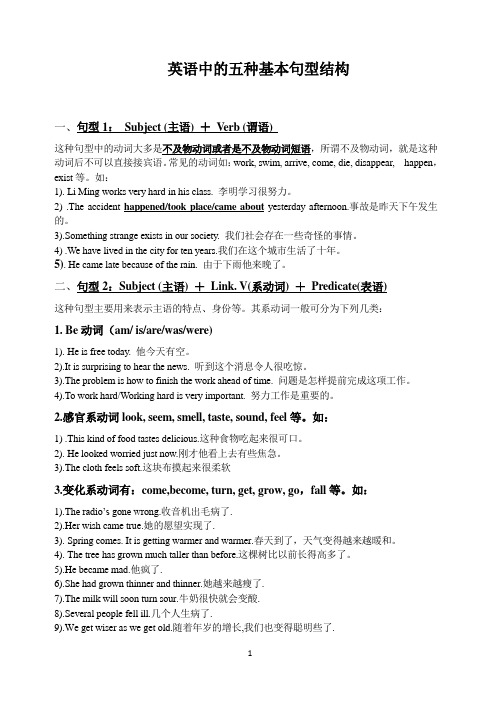
英语中的五种基本句型结构一、句型1:Subject (主语) +Verb (谓语)这种句型中的动词大多是不及物动词或者是不及物动词短语,所谓不及物动词,就是这种动词后不可以直接接宾语。
常见的动词如:work, swim, arrive, come, die, disappear, happen,exist等。
如:1). Li Ming works very hard in his class. 李明学习很努力。
2) .The accident happened/took place/came about yesterday afternoon.事故是昨天下午发生的。
3).Something strange exists in our society. 我们社会存在一些奇怪的事情。
4) .We have lived in the city for ten years.我们在这个城市生活了十年。
5). He came late because of the rain. 由于下雨他来晚了。
二、句型2:Subject (主语) +Link. V(系动词) +Predicate(表语)这种句型主要用来表示主语的特点、身份等。
其系动词一般可分为下列几类:1. Be动词(am/ is/are/was/were)1). He is free today. 他今天有空。
2).It is surprising to hear the news. 听到这个消息令人很吃惊。
3).The problem is how to finish the work ahead of time. 问题是怎样提前完成这项工作。
4).To work hard/Working hard is very important. 努力工作是重要的。
2.感官系动词look, seem, smell, taste, sound, feel等。
如:1) .This kind of food tastes delicious.这种食物吃起来很可口。
基本句型的结构及其用法

Mr.Smith asked me us some questions in the class. 4. 约翰没有对经理说实话。 tell, did, not, John, manager, the, the, truth
You must hand in your exercise-books after class.
四.主+谓+间宾+直宾
主语+谓语+双宾语(间接宾语+直接宾语)。
He bought me a ring. She takes me some food. They give me an apple. The girl showed me the way. I told she what to do.
3.主+谓+宾+(状)
这种句型中的动词一般为及物动词,后接宾语,宾语后面跟 副词、介词短语等作状语,说明动作发生的情况,构成主谓 宾状句型。例: 1. I bought a book yesterday. 2. She likes dancing very much.
1. 他两年前就不教书了。 he, his, teaching, two, gave, up, years, ago He gave up his teaching two years ago.
There be 句型
: There be 结构主要用以表达 “某地有某人(某物)”。其基本句 型为“There be + 某物或某人(主语) + 某地”。
:(1) There is + 单数可数名词/不可数名词+ 地点状语. E.g. There is a desk in the classroom. 在教室里有一张桌子。
英语句型基本结构

英语句型基本结构1.主+谓(不及物动词)Man can think. The fire is burning.不可忽视:常用不及物动词有break, breathe, burn, smoke, swim, skate, appear, disappear, work, think etc. 2.主+谓+表语(系动词)He became a scientist. She is getting more and more beautiful.不可忽视:常用系动词:be, get, turn, feel, seem, appear, look taste, sound, smell, become, go, prove etc. 3.主+谓+宾(及物动词)We love peace.They will paint the door.常用动词有:see, watch, need, love, like, study, answer, carry, etc.4.主+谓+宾+宾补We elected him president.They painted the door white.I advised the students to recite the texts. 王牌重点:常用作宾补的形式:(1)名词:The couple named their baby Johnson. (2)形容词:I keep the door open. (3)副词:The naughty boy knocked the bottle over. (4)不定式:He ordered his men to fire. (5)分词:He heard me singing.I saw the vase broken. (6)介词短语:They look on him as a teacher. (7)名词性从句:I asked him what he was doing. 5.(1)主+谓+间接宾语+直接宾语My friend bought me a gift.I passed him the book.(2)主+谓+直宾+介词+间宾My friend bought a gift for me.I passed the book to him.常与介词for 搭配的动词有:buy, make, do get, play, call, choose, cook, fetch, find, keep order, save, etc. 常与介词to 搭配的动词有:bring, give, grant, hand, pass, lend, offer, pay, promise, sell, send, show, each, tell, throw, write, etc.一、一般现在时:1.构成:使用动词原形,第三人称单数须有变化。
初中英语句型结构大全

初中英语句型结构大全一、名词句型1. 主语 + 系动词 + 表语- My brother is a teacher.- The movie was interesting.2. 主语 + 动词 + 名词- They bought a new car.- I cook dinner every day.3. 主语 + 动词 + 名词 + 介词短语- She plays the guitar in her free time.- We visited the museum on Saturday.4. 主语 + 动词 + 双宾语- He gave me a present.- They showed us their new house.5. 主语 + 动词 + 宾语 + 宾语补足语- We elected him class monitor.- She made her mother proud.6. 主语 + 动词 + 不定式- I want to learn how to swim.- He needs to finish his homework.7. 主语 + 动词 + 动名词- They enjoy swimming in the lake.- She loves reading books.8. 主语 + 动词 + 不定式/动名词 + 宾语- I heard him sing a song.- I watched her play basketball.9. there be 句型- There is a cat on the tree.- There are some apples in the basket.二、形容词句型1. 主语 + be + 形容词- She is beautiful.- It is cold today.2. 主语 + be + 名词 + 形容词- He is a hardworking student.- They are happy children.3. 主语 + be + 形容词 + 不定式/动名词- The book is interesting to read. - The movie is exciting to watch.4. 主语 + 动词 + 形容词- I find the story very interesting. - We consider it important to study.5. 主语 + 动词 + 名词 + 形容词- They made me feel proud of myself. - She found the movie boring.6. 主语 + 动词 + 形容词 + 宾语- We keep our classroom clean.- He made his sister happy.三、副词句型1. 主语 + 动词 + 副词- He runs fast.- She speaks English fluently.2. 主语 + be + 副词- The weather is really nice.- The food smells delicious.3. 主语 + 动词 + 形容词 + 副词- They sing beautifully.- He plays tennis well.4. 主语 + 动词 + 副词 + 宾语- I eat breakfast early in the morning.- They finished their work quickly.四、介词句型1. 动词 + 介词 + 宾语- She looks at herself in the mirror.- He listens to music every evening.2. 形容词/副词 + 介词 + 宾语- She is afraid of spiders.- The cat jumps onto the table.3. 名词/代词 + 介词 + 名词/代词- I gave the book to him.- She borrowed a pen from me.五、连接词句型1. 并列连词- She is smart and beautiful.- He likes playing basketball but hates swimming.2. 结果连词- She studied hard, so she passed the exam.- He didn't study, therefore he failed the test.3. 条件连词- If it rains tomorrow, we will stay indoors.- Unless you finish your homework, you can't play video games.4. 原因连词- He is tired because he stayed up late last night.- We missed the bus as we woke up late.5. 转折连词- He is nice, but sometimes he can be mean.- I love ice cream; however, I am lactose intolerant.6. 让步连词- Although it was raining, they went hiking.- Despite feeling tired, she continued to work.六、从句句型1. 名词性从句- What she said is true.- Whether he will come or not is uncertain.2. 定语从句- The book that she lent me is very interesting.- The girl who won the race is my friend.3. 状语从句- I will go to the party if I have time.- She cried because she failed the test.以上是初中英语常用的句型结构,包括名词句型、形容词句型、副词句型、介词句型、连接词句型和从句句型。
五种基本句型结构
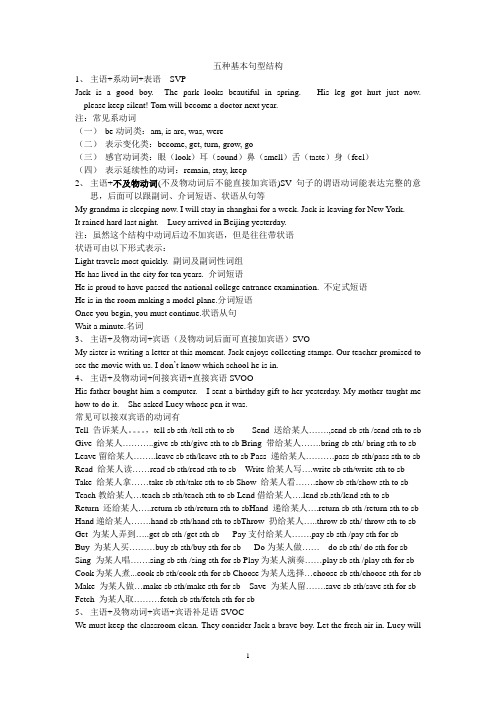
五种基本句型结构1、主语+系动词+表语SVPJack is a good boy. The park looks beautiful in spring. His leg got hurt just now. please keep silent! Tom will become a doctor next year.注:常见系动词(一)be动词类:am, is are, was, were(二)表示变化类:become, get, turn, grow, go(三)感官动词类:眼(look)耳(sound)鼻(smell)舌(taste)身(feel)(四)表示延续性的动词:remain, stay, keep2、主语+不及物动词(不及物动词后不能直接加宾语)SV 句子的谓语动词能表达完整的意思,后面可以跟副词、介词短语、状语从句等My grandma is sleeping now. I will stay in shanghai for a week. Jack is leaving for New York.It rained hard last night. Lucy arrived in Beijing yesterday.注:虽然这个结构中动词后边不加宾语,但是往往带状语状语可由以下形式表示:Light travels most quickly. 副词及副词性词组He has lived in the city for ten years. 介词短语He is proud to have passed the national college entrance examination. 不定式短语He is in the room making a model plane.分词短语Once you begin, you must continue.状语从句Wait a minute.名词3、主语+及物动词+宾语(及物动词后面可直接加宾语)SVOMy sister is writing a letter at this moment. Jack enjoys collecting stamps. Our teacher promised to see the movie with us. I don’t know which school he is in.4、主语+及物动词+间接宾语+直接宾语SVOOHis father bought him a computer. I sent a birthday gift to her yesterday. My mother taught me how to do it. She asked Lucy whose pen it was.常见可以接双宾语的动词有Tell 告诉某人。
五种基本句型__主谓宾宾(宾补)结构_实用练习加详细解析
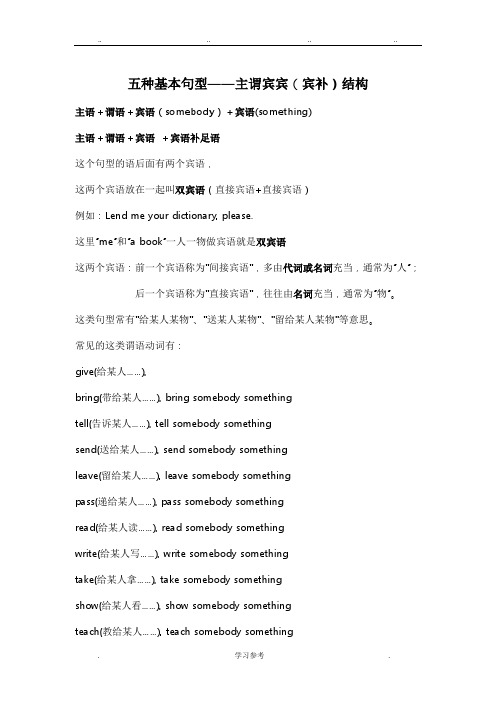
五种基本句型——主谓宾宾(宾补)结构主语+谓语+宾语(somebody)+宾语(something)主语+谓语+宾语+宾语补足语这个句型的语后面有两个宾语,这两个宾语放在一起叫双宾语(直接宾语+直接宾语)例如:Lend me your dictionary, please.这里“me”和“a book”一人一物做宾语就是双宾语这两个宾语:前一个宾语称为"间接宾语",多由代词或名词充当,通常为“人”;后一个宾语称为"直接宾语",往往由名词充当,通常为“物”。
这类句型常有"给某人某物"、"送某人某物"、"留给某人某物"等意思。
常见的这类谓语动词有:give(给某人……),bring(带给某人……), bring somebody somethingtell(告诉某人……), tell somebody somethingsend(送给某人……), send somebody somethingleave(留给某人……), leave somebody somethingpass(递给某人……), pass somebody somethingread(给某人读……), read somebody somethingwrite(给某人写……), write somebody somethingtake(给某人拿……), take somebody somethingshow(给某人看……), show somebody somethingteach(教给某人……), teach somebody somethingget(给某人弄到……), get somebody somethinglend(借给某人……), lend somebody somethingbuy(给某人买……), buy somebody somethingpay(支付给某人……), pay somebody somethinghand(递给某人……) 。
高中英语句子结构及五种基本句型
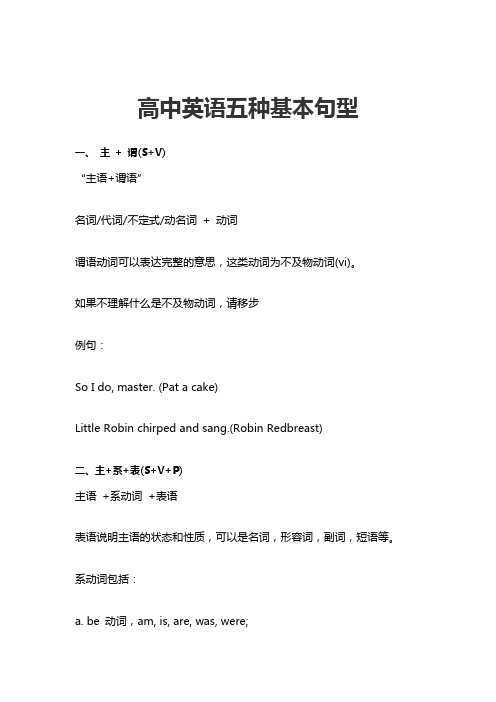
高中英语五种基本句型一、 主 + 谓(S+V)“主语+谓语”名词/代词/不定式/动名词+ 动词谓语动词可以表达完整的意思,这类动词为不及物动词(vi)。
如果不理解什么是不及物动词,请移步例句:So I do, master. (Pat a cake)Little Robin chirped and sang.(Robin Redbreast)二、主+系+表(S+V+P)主语+系动词+表语表语说明主语的状态和性质,可以是名词,形容词,副词,短语等。
系动词包括:a. be 动词,am, is, are, was, were;b. 表感官:feel, smell, sound, taste, look;c. 表变化:become, grow, turn, go, get, fall;d. 表状态:remain, keep, hold, stay, seem.例句:I'm always alone. (Little Jumping Joan)The storms grow stronger. (Lightening Days)He was so small. (Jerry Hall)三、主+谓+宾(S+V+O)主语+谓语+宾语谓语一般为及物动词(vt.),后面必须要跟宾语才能表达完整的意思。
宾语是谓语动词动作的承受者。
例句:They broke my pitcher, and spilt the water, and huffed my mother, and chid her daughter, and kissed my sister instead of me. (A Melancholy Song)I met a man with seven wives. (Going to ST.ives)We'll have a pudding in half an hour. (Come out to Play)March winds and April showersbring forth May flowers. (March winds)四、主+谓+间宾+直宾S+V+IO+O这种句型,谓语动词必须要跟两个宾语才能表达完整意思。
五大基本句型

二、简单的五种基本句型:1、S(主)+ Vi(不及物动词)(谓语)——→主动结构例如:Time flies.1)S + V +副词(状语)例如:Birds sing beautifully.2)S + Vi +介词短语(状语)例如:He went on holiday.3)S + Vi +不定式(状语)例如:We stopped to have a rest.4)S + Vi +分词(状语)例如:I'll go swimming.2、S (主)+ Vt(及物动词)(谓语)+ O(宾语)——→主动宾结构例如:We like English.1)S + Vt +名词/代词例如:I like music.2)S + Vt +不定式例如:I want tohelp him.[说明]常用于这句型的动词有:decide, hope, learn,need, promise, want,等。
3)S + Vt +疑问词+不定式例如:I don't knowwhat to do.[说明]常用于这句型的动词有:ask, decide, find out, forget, know等。
4)S + Vt +动名词例如:I enjoyliving here.[说明]常用于这句型的动词有:advise, enjoy, finish, mind, practise等。
5)S + Vt +宾语从句例如:I don't think(that) he is right.[说明]常用于这句型的动词有:hope, know, notice, think, wonder等。
【难点】3、S (主)+ V(谓语)(系动词)+ P(表语)——→主系表结构例如:We areChinese.[说明]Ⅰ.除了be系动词外,还有一些动词也可以用作系动词,①表感官的动词,feel, smell,taste, sound, look, seem等。
英语五种基本句型结构

英语五种基本句型结构英语中的五种基本句型结构一、句型1:Subject (主语) +Verb (谓语)这种句型中的动词大多是不及物动词,所谓不及物动词,就是这种动词后不可以直接接宾语。
常见的动词如:work, sing, swim, fish, jump, arrive, come, die, disappear, cry, happen等。
如:1) Li Ming works very hard.李明学习很努力。
2) The accident happened yesterday afternoon.事故是昨天下午发生的。
3)Spring is coming.4) We have lived in the city for ten years.二、句型2:Subject (主语) +Link. V(系动词) +Predicate(表语)这种句型主要用来表示主语的特点、身份等。
其系动词一般可分为下列两类:(1)表示状态。
这样的词有:be, look, seem, smell, taste, sound, keep等。
如:1) This kind of food tastes delicious.这种食物吃起来很可口。
2) He looked worried just now.刚才他看上去有些焦急。
(2)表示变化。
这类系动词有:become, turn, get, grow, go等。
如:1) Spring comes. It is getting warmer and warmer.春天到了,天气变得越来越暖和。
2) The tree has grown much taller than before.这棵树比以前长得高多了。
三、句型3:Subject(主语) +Verb (谓语) +Object (宾语)这种句型中的动词一般为及物动词, 所谓及物动词,就是这种动词后可以直接接宾语,其宾语通常由名词、代词、动词不定式、动名词或从句等来充当。
(完整版)英语五大基本句型结构
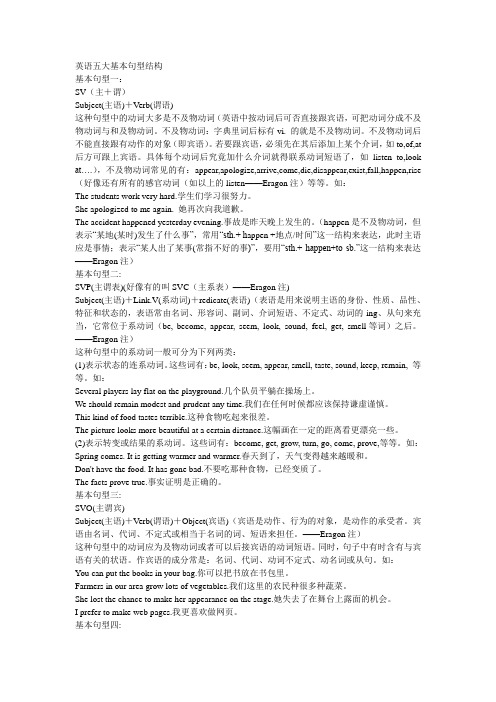
英语五大基本句型结构基本句型一:SV(主+谓)Subject(主语)+Verb(谓语)这种句型中的动词大多是不及物动词(英语中按动词后可否直接跟宾语,可把动词分成不及物动词与和及物动词。
不及物动词:字典里词后标有vi. 的就是不及物动词。
不及物动词后不能直接跟有动作的对象(即宾语)。
若要跟宾语,必须先在其后添加上某个介词,如to,of,at 后方可跟上宾语。
具体每个动词后究竟加什么介词就得联系动词短语了,如listen to,look at….),不及物动词常见的有:appear,apologize,arrive,come,die,disappear,exist,fall,happen,rise (好像还有所有的感官动词(如以上的listen——Eragon注)等等。
如:The students work very hard.学生们学习很努力。
She apologized to me again. 她再次向我道歉。
The accident happened yesterday evening.事故是昨天晚上发生的。
(happen是不及物动词,但表示“某地(某时)发生了什么事”,常用“sth.+ h appen +地点/时间”这一结构来表达,此时主语应是事情;表示“某人出了某事(常指不好的事)”,要用“sth.+ happen+to sb.”这一结构来表达——Eragon注)基本句型二:SVP(主谓表)(好像有的叫SVC(主系表)——Eragon注)Subject(主语)+Link.V(系动词)+redicate(表语)(表语是用来说明主语的身份、性质、品性、特征和状态的,表语常由名词、形容词、副词、介词短语、不定式、动词的-ing、从句来充当,它常位于系动词(be, become, appear, seem, look, sound, feel, get, smell等词)之后。
——Eragon注)这种句型中的系动词一般可分为下列两类:(1)表示状态的连系动词。
英语五种基本句型结构

• 27. collect 28. combat 29.concentrate 30.conduct 31.confirm 32.confront 33.consume34.control 35.convey 38. cut 39. damage 40. debate 41.delay 42.deliver 43.demonstrate 44.deny 45.deserve 46. destroy 47.determine 48.develop 49. discuss
2.双宾语易位时需借助介词for的常用动词
• book sb. sth. = book sth. for sb. 为某人预定某物
• buy sb. sth. = buy sth. for sb. 为某人买某物
• choose sb. sth. = choose sth. for sb. 为某人选某物
The weather suddenly turned much colder. 2)注意turn后接名词作表语不带冠词
turn doctor=become a doctor=make a doctor 成为一名医生
3.1)go作为连系动词,通常与形容词连用,通常表示由好变坏或 由正常情况变成特殊情况。
grow, turn, go变成,成为
1. grow常指逐渐地变成新状态,强调渐变的过程。
grow tall长高;grow louder(声音)大起来 2. 1)turn后面多接表示颜色的形容词作表语,也可以接表示 天气的形容词作表语侧重指变得与原来截然不同。
常用句型主语动词名词短语
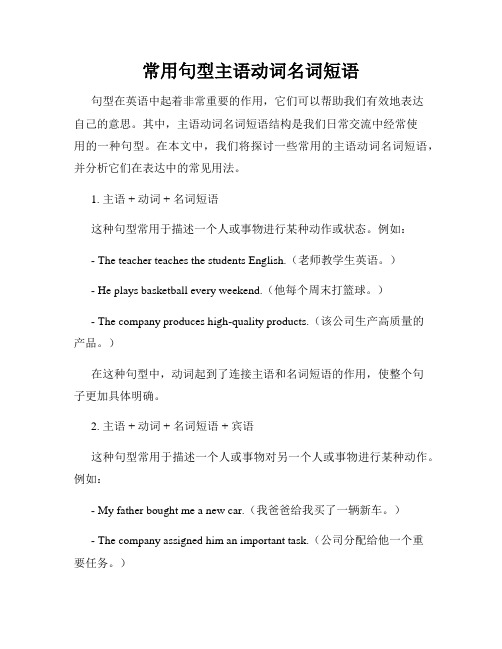
常用句型主语动词名词短语句型在英语中起着非常重要的作用,它们可以帮助我们有效地表达自己的意思。
其中,主语动词名词短语结构是我们日常交流中经常使用的一种句型。
在本文中,我们将探讨一些常用的主语动词名词短语,并分析它们在表达中的常见用法。
1. 主语 + 动词 + 名词短语这种句型常用于描述一个人或事物进行某种动作或状态。
例如:- The teacher teaches the students English.(老师教学生英语。
)- He plays basketball every weekend.(他每个周末打篮球。
)- The company produces high-quality products.(该公司生产高质量的产品。
)在这种句型中,动词起到了连接主语和名词短语的作用,使整个句子更加具体明确。
2. 主语 + 动词 + 名词短语 + 宾语这种句型常用于描述一个人或事物对另一个人或事物进行某种动作。
例如:- My father bought me a new car.(我爸爸给我买了一辆新车。
)- The company assigned him an important task.(公司分配给他一个重要任务。
)- She sent her friend a birthday card.(她给她的朋友送了一张生日卡。
)在这种句型中,名词短语充当宾语,接受动作的对象。
3. 主语 + 动词 + 名词短语 + 间接宾语 + 直接宾语这种句型常用于描述一个人或事物给另一个人或事物做某种事情。
例如:- My parents bought me a new computer as a birthday present.(我父母给我买了一台新电脑作为生日礼物。
)- The company awarded its employees a bonus for their outstanding performance.(公司给予其员工奖金以表彰其杰出表现。
句型结构

句型一:主语+不及物动词(S+V)不及物动词本身就可以表达完整的意念,不需要宾语及补语,但有时可有副词,介词短语等状语修饰语。
e.g. The rainstopped .The old man walks in the park .句型一的扩展:1.主语+不及物动词+状语e.g. The machine works smoothly. (机器运转正常。
)2.There +不及物动词+主语e.g. There is some milk in the bottle .There comes the bus .3. 主语+不及物动词+ 动词不定式e.g. They stopped to take a short rest . (他们停下来稍作休息)特别提醒动词stop 可用作不及物动词,也可用作及物动词。
作不及物动词时, 通常后接动词不定式,表示停下来的目的是做另一件事。
作及物动词时,通常后接动名词,表示停止做这件事。
e.g. They stopped taking a rest .句型二:主语+系动词+表语(S+V+P)系动词本身不能表达完整的意念没,需要形容词,名词,介词短语等来补充说明主语,也叫主语补语。
e.g. My sister is a nurse .I feel quite hungry .The ball is under the desk .句型三:主语+及物动词+宾语(S+V+O)及物动词本身需要一个动作的接受者(宾语),才可以表达一个完整的意念。
e.g. We are learning English .Do you know him ?Your radio needs repairing .She hopes to see her uncle.句型四:主语+及物动词+间接宾语+直接宾语(S+V+IO+DO)有些及物动词需要两个宾语才能表达一个完整意念。
e.g. Her mother bought her a skirt.Give me the book, please.特别提醒A. 在此句型中,通常是间接宾语(人)在前,直接宾语(物)在后,有时直接宾语和间接宾语可以对调,这时间接宾语前应加上适当的介词。
- 1、下载文档前请自行甄别文档内容的完整性,平台不提供额外的编辑、内容补充、找答案等附加服务。
- 2、"仅部分预览"的文档,不可在线预览部分如存在完整性等问题,可反馈申请退款(可完整预览的文档不适用该条件!)。
- 3、如文档侵犯您的权益,请联系客服反馈,我们会尽快为您处理(人工客服工作时间:9:00-18:30)。
英语词组短语句型1. Able ability enable capable be able to do能够做…have the ability to do能够做,有能力做…:He has the ability to make very good boat.enable sb to do使…能做…:Internet has enabled us to get information from all over the world.Be capable of能够做…: He is capable of drawing oil painting.He is able to read and write in English.2. Absent 反义词:present3. Abroad国外,海外: live ~ go ~Many young people are eager to go abroad to study.4. Access: 入口,途径;机会,权利。
Have access to sthCitizens in the town all have access to the books in the local(当地的)library.5. Absorb 吸收be absorbed in全神贯注于…All the students are absorbed in Professor’s lecture on China’s economy.6. Accept接受receive收到(不一定接受)She received a gift from him, but she didn’t accept it.7. By accident=by chance 偶然地on purpose 故意地8. According to 根据According to the article, environmental pollution has been taken under control.9. Take…into account=take…into consideration 把…考虑在内I hope my teacher will take into account my illness when he grades our test paper.Account 描述She gave an account of what he saw in China.10. Accuse sb of sth = charge sb with(for) sth 指责…做了…;指控…犯了…He was accused of robbing the bank and sentenced ten years in gail.His mother charged him with being lazy.11. Be accustomed to = be used to 习惯于后接sth或doing sthused to 过去有过去常常后接do sthMr. Smith is not used/accustomed to driving on the right.I’m already used to the life here.There used to be a house near the river.He used to get up while he was in the middle school.12. Achieve 获得,达到You will achieve nothing if you waste your time this way.13. Adapt=adjust 适应~ adopt 收养;采用You should adapt to college life as soon as possible.He adjusted himself very quickly to the weather in the country.14. Add to 增添add up to 总计达15. In addition(to)=besides 此外In order to master a foreign language, we should learn some grammar. In addition, we’d betterlearn some words.16. Adequate=enough17. Admit 承认He admitted him mistake at last.18. In advance 预先,提前You should inform(通知)me in advance if you are going to come.19. Take advantage of = make use of 利用We can take advantage of computer to analyze data.A good habit in learning is to make full use of class time.20. Affect (v.) effect (n.) influence (v & n) 影响effort 努力have an effect/influence on对…有影响make an effort to do或make efforts to doThe latest discovery in gene will have a great effect on the health of human beings.They made great efforts to find a new cure to lung cancer .21. Afford (to do) sth 买/花/用/支付得起It’s hard to imagine how he can afford (to buy) a house on his small salary.22. Be afraid of 担心,害怕23. At the age of24. Agree with 同意agree on 同意(双方就…达成一致)agree to 同意(上级,父母对下级,晚辈允许…)The two countries have agreed on the date for next talk.My parents don’t agree to my staying outside overnight.25. Ahead of time 提前We finished our assignment ahead of time.26. By air=by plane by sea= by ship by bus/train on foot26. After all 毕竟above all 首先(not…) at all 一点(也不)all over28. Allow/permit …to do…允许…做…29. Although/though but 连词不能同时用在句子中。
As连词倒装句in spite of/despite介词不连接句子Although he was seriously ill, he went on with the experiment.Young as he is, he has already learned three foreign languages: English, French and Japanese. Although he is young,he has already learned three foreign languages :English, French and Japanese.In spite of/despite his illness, he went on with his experiment.30. Be angry with sb be angry at sth31. Apart from=besides除了….之外,还有….=except除了…No one knows what happened except mr. Smith.He has a large collection of books besides CDs.32. Apply ( ~ for 申请) 应用He has successfully applied for a position(职位)in the company.33. Appreciate 欣赏感激(加动名词doing)I really appreciate your coming to the party. 类似动词有:enjoy, mind介意, avoid避免, escape逃避, can’t help禁不住, risk冒险, need=want需要insist on 坚持My hair needs cutting.34. Approve 赞成,批准35. Argue with sb 与…争论36. Arise ~ from rise arouse raiseNew problems will arise as the old ones have been solved.(出现)Are there any things arising from last meeting? (源于)His speech aroused little interest among the students.(引起,激起)The company has raised the prices of its products.(提高)The prices of goods rose day by day during the Spring Festival.(上升)37.Artificial 人工的,假的~ flowers38. As for 至于as to 关于,至于as if/though 似乎,好象39. Ask for 要求40. Attach importance to 重视41. Pay attention to重视catch one’s attention 引起…注意/重视42. Available 可得/买到的There is no ticket available.43.Average 平均on( the ) ~44. Be aware of = realize 意识到be sure 一定要,肯定He apologized to us for the mistake as soon as he was aware of it.Be sure not to be late for the meeting.I’m sure the play will be a great success.45. Back up 支持46. Background 背景47. Base ~…on…把…建立在…基础之上His article is based on the research.48. Bear 忍受,容忍同义词:endure tolerate stand put up withShe cannot bear to see the child in pains.49. Do/try one’s bestHe said he would try his best to carry out the plan.50. Because 连词:There will be no meeting because the manager will be on the vacation next week.because of 介词: His wedding will be put off because of his father’s death.51. Best make the ~ of 很好地利用52. Had better do 最好You’d better finish reading the book in this week, since I’m going to return it to the library.would rather do 宁愿I’d rather go there myself.53. Beyond 超出…The professor’s lecture is beyond me/beyond my understanding (超出我的理解范围).The apple on the tree is beyond my reach(够不着)。
